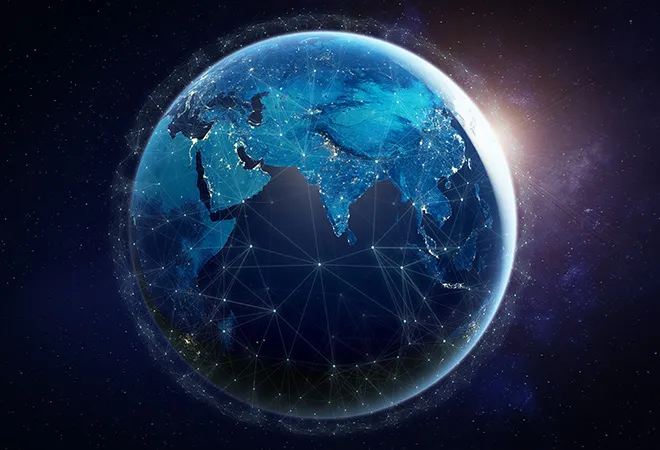"The Impact of Geopolitics on Modern Society"
International relations, the study of the interplay between geography, politics, and power, has profoundly influenced the development of human societies. From ancient empires to modern states, geopolitical considerations have shaped borders, dictated alliances, and influenced conflicts. In the 21st century, international relations continue to play a crucial role in global affairs, impacting economies, cultures, technology, and international cooperation.
This article delves into the ways international relations shape modern culture, examining their influence on global power structures, economic trends, cultural interactions, technological advancements, and environmental challenges.
1. Defining International Relations and Its Modern Context
The Evolution of Geopolitical Thought
Historically, international relations focused on territorial expansion, resource control, and military strength. Early theorists, like Halford Mackinder, emphasized the strategic significance of land and sea, while later ideas explored the relationship between technology and geography.
In the modern era, international relations encompass a broader range of factors, including economic relationships, technological competition, and environmental challenges. The rise of globalization has interconnected nations, making international decisions more complex and impactful.
Global Power Structures
The Cold War's bipolar world, dominated by the United States and the Soviet Union, has given way to a multipolar landscape. Emerging powers like China, India, and the European Union are challenging the dominance of traditional superpowers, leading to shifting alliances and new strategies in international relations.
2. The Impact on Global Economics
Trade and Supply Chains
Geopolitical tensions directly affect global trade and supply chains. Events like the U.S.-China trade war have disrupted supply chains, pushing companies to diversify their reliance on specific regions. Examples include:
- Decoupling Trends: Shifts in supply chains from China to Southeast Asia and India.
- Energy Politics: Geopolitical struggles over oil and gas resources have caused price volatility, impacting global markets.
Economic Sanctions and Financial Systems
Sanctions are a powerful tool of international relations. For instance, sanctions against Russia after its actions in Ukraine isolated its economy while pushing it toward closer alliances with China and other non-Western countries. Additionally, the rise of alternative financial systems, such as China's digital yuan and cryptocurrency networks, challenges the dominance of the U.S. dollar in global trade.
3. International Relations and Technology
Technological Rivalries
The competition for technological supremacy is a cornerstone of modern international relations. The United States and China, for instance, are engaged in a race for dominance in areas such as:
- Artificial Intelligence (AI): Advances in AI have implications for defense, economics, and social governance.
- 5G Networks: Control over global telecommunications infrastructure is a critical geopolitical battleground.
- Semiconductors: The global chip shortage highlights the importance of secure semiconductor supply chains in national security.
Cybersecurity and Geopolitical Conflicts
Cyberattacks have become a modern warfare tool. State-sponsored hacking groups target government institutions, corporations, and critical infrastructure. High-profile examples include:
- Russian interference in elections.
- Cyber espionage campaigns linked to China.
- North Korean cyber heists targeting financial institutions.
4. International Relations and Culture
Cultural Diplomacy
Countries leverage culture as a soft power tool to influence global perceptions. Initiatives like China’s Confucius Institutes and South Korea’s Hallyu wave demonstrate how cultural exports shape international relations and foster positive associations.
Migration and Identity
Geopolitical conflicts often lead to mass migrations, reshaping societies and challenging cultural integration. Examples include:
- Refugee crises from the Middle East and Africa.
- Migration pressures on Europe, sparking political debates over immigration policies and national identity.
5. The Role of International Relations in Environmental Challenges
Climate Change and Resource Conflicts
Environmental issues are increasingly intertwined with international relations. Nations compete for scarce resources, such as water, arable land, and rare earth metals, heightening regional tensions.
- Arctic Geopolitics: Melting ice caps have opened new shipping routes and untapped oil reserves, fueling competition among Arctic nations.
- Water Conflicts: Disputes over shared water resources, such as the Nile River, highlight the geopolitical dimensions of environmental challenges.
Global Cooperation
While competition often defines international relations, global challenges like climate change demand cooperation. Initiatives like the Paris Agreement illustrate the potential for collective action, though geopolitical rivalries frequently hinder progress.
6. International Relations and Security
Military Alliances and Conflicts
Geopolitical tensions often manifest as military alliances or conflicts. NATO's expansion, China's military activities in the South China Sea, and ongoing conflicts in the Middle East demonstrate how security concerns shape international relations.
Non-State Actors
Modern international relations must also address the influence of non-state actors, including:
- Terrorist Organizations: Groups like ISIS destabilize regions and challenge state sovereignty.
- Corporations: Tech giants like Google and Meta influence global policies, especially in areas such as data privacy and content regulation.
7. The Impact on Everyday Life
Economic Implications
Geopolitical decisions influence global markets, affecting commodity prices, job availability, and economic stability. Trade wars, for example, impact the cost of goods and their availability to consumers.
Technology and Connectivity
Access to technology and the internet is shaped by international policies, with regulations on data sovereignty and internet governance affecting how people communicate and share information.
Cultural Exchange
International dynamics influence cultural interactions, shaping perceptions and fostering understanding between nations. Exchange programs, global media, and tourism are all impacted by international relations.
8. The Future of International Relations in Modern Culture
Trends to Watch
- Rise of Regional Powers: Countries like India, Brazil, and Turkey are emerging as influential regional players.
- Shift Toward Multilateralism: As global challenges grow, nations may increasingly turn to multilateral frameworks for solutions.
- Digital Geopolitics: Control over digital infrastructure and cyber policies will dominate future international agendas.
Navigating Challenges
To mitigate the negative impacts of international relations, nations must prioritize diplomacy, sustainable practices, and technological innovation. Public awareness and global cooperation are essential for fostering a more equitable and stable international system.
Conclusion
The influence of international relations on modern culture is profound, shaping everything from economic stability and technological innovation to cultural exchange and environmental sustainability. In an increasingly interconnected world, understanding the dynamics of international relations is essential for shaping a future that balances power with progress, competition with cooperation, and ambition with responsibility.
By addressing international challenges thoughtfully, nations can harness their potential to drive positive change, ensuring that modern society evolves in harmony with the complexities of our global landscape





